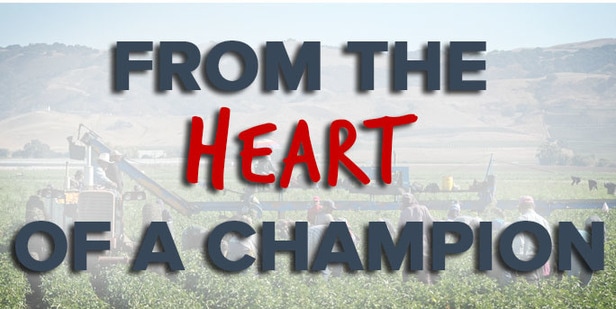 This is the first story in our monthly Ag Worker Access 2020 Campaign blog series. Hilda Ochoa Bogue has been with NCFH for 15 years, and serves as the Research and Development Director. This is Hilda’s story. In 1990, I was living in a small Illinois university town where only very few people spoke Spanish. One day when my husband and I were at the grocery store, I heard people in the next aisle speaking Spanish and I decided to go and introduce myself. It was a young couple with three little girls; the family was one of the 30 mostly Spanish-speaking migratory agricultural workers from the TX Rio Grande Valley. We had a lovely conversation, exchanged contact information and invited each other to visit and to call if something was needed. The following weekend, we invited the 30 families for a picnic in our back yard and all of us had a great time; my husband and some of the male ag workers cooking hamburgers, the ladies making tacos, the teenagers sharing experiences about schools and places they stopped along the migratory stream; and the kids playing “a los encantados.” Later the group invited us to their houses for a great “tamalada.” During our visits, I learned that every April those families left their TX hometown and traveled to Washington State for asparagus harvest. In that state, it was legal for teenagers to work along with their parents from 5:00am to 11:00am, as long as they attended school—so the kids would bring a clean set of clothes and their books to work with them. At 11:00am a school bus took them to school where they showered before presenting to the classroom for a full class day. The group stayed in Washington until the end of May when the asparagus harvest ended, and then drove to Illinois for 6-8 weeks’ work detasseling corn for the Pioneer Seed Company. At the end of July or middle of August, the group started their return to their Texas home base in the Rio Grande Valley and arrived just in time to enroll their children in school. Two weeks after we had the picnic, I received a call from Dona Tonita--one of the grandmothers that was taking care of the children while the parents were working in the fields. She said that one of her neighbors, a farmworker woman, was very scared because her baby had “calentura” and she didn’t have any medication. She also said that the baby’s father was working and that there was nobody there that knew how to drive or where the hospital was. I drove to Dona Tonita’s home and she took me to the very worried mother. I took the mother and her baby to the emergency room at the County hospital; the baby was treated and discharged later that night. On another day, I received another call from Dona Tonita; this time she reported that a wife of an agricultural worker was having “dolores de parto” and needed to go to the hospital. I took the pregnant woman to the hospital and stayed with her until she delivered a beautiful little boy. The delivery was without any complications but the mother was sad because the father didn’t arrive in time to witness the birth of their first child. As a nurse, I had the opportunity to be present at several deliveries, but none of them have touched me as much as that one did. I don’t know if it was because I felt sorry for the young, first-time mother that was there delivering her baby without the support of her family, because I remembered her black eyes looking at me with an expression of confusion every time a member of the great team that took care of her tried to communicate with her in English, or perhaps because I saw how that mother’s worries dissipated as soon as she heard her baby crying, or when the father arrived in surgical clothes—provided by the hospital because he arrived completely soaked since it was a rainy day—and was able to hold his first baby and kissed his wife. Perhaps because of all those moments. For the rest of those weeks, when I was not at the university, I became the group’s advocate, interpreter, driver, and…the best customer for Dona Tonita fresh breakfast tacos. Knowing so little about the migratory agricultural worker movement in the USA—even though my own father, a Bracero, had been a migratory worker even before I was born, and three of my brothers worked in California as agricultural workers—and closely witnessing the difficulties encountered by this group, I decided to learn as much as I could about migratory workers. I learned as much as I could about agricultural workers from my father and brothers, and for my master’s thesis I traveled to the Valley and lived with Dona Tonita and her family for a month while I conducted field interviews assessing the health care needs of the group of migratory agricultural workers at their home base and along the migratory stream. Through that experience I not only learned about the difficult life and working conditions of migratory agricultural workers, but also their strong family ties and sense of community--the way they helped and supported each other during migration, their work ethics, how much they urged their kids to continue their education—so they would not end up working in the fields all their lives. I also learned how to prevent “mal de ojo” and how to treat “susto” and how to prepare some home remedies. Oh… I almost failed to mention, I also learned how to make fresh tortillas! After graduation, I was accepted to the Man Power Access to Community Health (MATCH) program, a one-year clinical administration fellowship. After classroom orientation and training at Johns Hopkins University, I selected the Colorado Migrant Health Program (CMHP) to do my fieldwork. The CMHP was a state-wide Migrant Health Voucher Program operating 16 seasonal sites to serve the seasonal migratory workers and their families arriving to work in agriculture. In that Program I felt right at home and, needless to say…I was hooked in Migrant Health. The rest is a story that is still being written since I don’t plan to move away from Migrant Health anytime soon. |
The National Center for Farmworker HealthImproving health care access for one of America's most vulnerable populations Archives
July 2024
Categories
All
|


 RSS Feed
RSS Feed